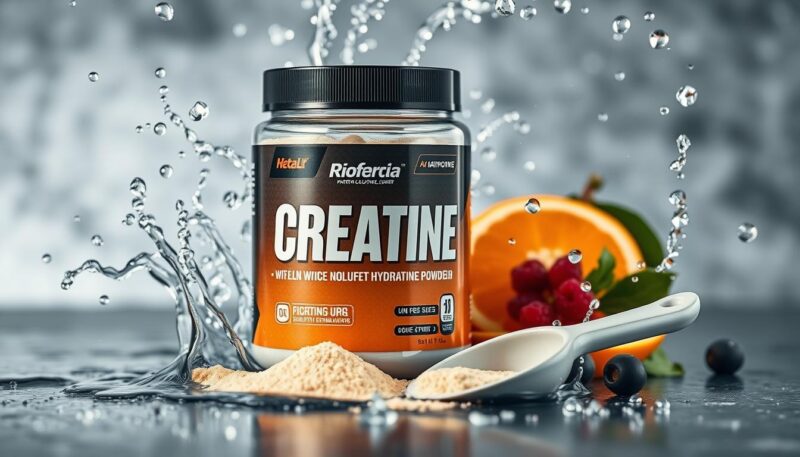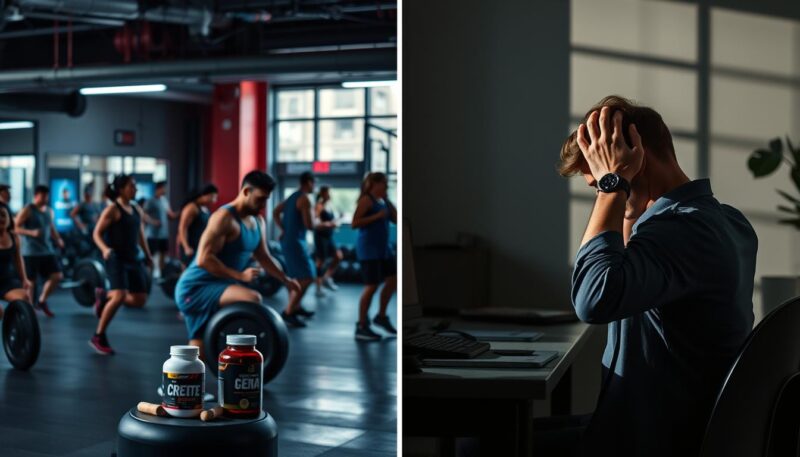Creatine supplementation has gained immense popularity among athletes and fitness enthusiasts, hailed for its potential to improve performance and energy levels.
Despite its benefits, questions occasionally arise about its side effects, particularly headaches.
Today, we want to shine a light on whether creatine causes headaches or not.
Is There a Direct Link Between Headaches and Creatine?
Scientific research largely indicates that creatine itself does not directly lead to headaches. However, anecdotal reports of such issues do exist, leading to ongoing curiosity and misinterpretations.
These accounts often stem from individual experiences that lack consistent patterns or concrete evidence.
The possibility of creatine causing headaches could be linked to indirect factors rather than the compound itself. For example, dehydration, overexertion, or underlying conditions may contribute to discomfort.
Distinguishing between direct and indirect causes is vital, as creatine is widely studied and generally considered safe when used properly.
Potential Indirect Causes of Headaches from Creatine
While creatine does not directly cause headaches, several factors associated with its use may contribute to discomfort.
These are primarily connected to:
Now, let us check the indirect cause of headaches from creatine.
Dehydration
Creatine works by pulling water into muscle cells to improve energy production and muscle recovery.
However, this process may leave other parts of the body slightly less hydrated if water intake is inadequate.
Dehydration is one of the most common causes of headaches during creatine supplementation.
- The body requires more water to compensate for the redistribution of fluids to the muscles.
- Dehydration can impair basic processes like temperature regulation and circulation, often leading to headaches.
- Drink water consistently throughout the day and increase fluid intake during physical activity to ensure proper hydration.
Electrolyte Imbalance
Intense exercise typically leads to significant fluid and electrolyte loss through sweating.
Sodium, potassium, and magnesium are essential electrolytes for nerve and muscle function, and their depletion can cause discomfort, including headaches.
- Strenuous activities amplify the need for electrolyte replenishment to maintain balance.
- Low electrolyte levels may lead to muscle cramps, fatigue, or headaches.
- Pair water with electrolyte supplements or consume foods like bananas, nuts, or sports drinks rich in essential minerals.
Exercise-Induced Headaches
Creatine’s ability to enhance endurance and strength frequently motivates users to push harder during workouts.
While this can improve performance, it also increases the risk of overexertion, a known trigger for exertion headaches.
Heat-Related Factors
Supplementing with creatine may lead to longer or more vigorous workouts, often in hot or humid conditions.
These environmental factors can exacerbate the risk of heat-related stress, dehydration, and headaches.
- Exercising in high temperatures increases the rate of fluid depletion, further straining hydration levels.
- Prolonged exposure to heat during workouts can lead to symptoms like dizziness or headaches.
- Schedule workouts during cooler parts of the day, hydrate frequently and wear breathable clothing to help regulate body temperature.
Tips to Minimize Headache Risks

Proper supplementation practices not only maximize benefits but also minimize any potential side effects.
Hydration
Adequate hydration is critical when taking creatine. The supplement increases water retention within muscles, which may shift hydration levels in your body.
To counteract this:
- Aim for at least 8–10 glasses of water daily, adjusting based on activity levels and body weight.
- Keep a water bottle handy during exercise and take frequent sips to replenish fluids lost through sweat.
- Include electrolyte-rich beverages or foods, such as bananas or sports drinks, to maintain optimal balance.
Dosage Management
Starting with the right dosage is vital to avoid overwhelming your body. Creatine is highly effective in smaller, controlled amounts:
- A typical strategy is to take 20 grams per day, divided into 4–5 smaller doses, for the first 5–7 days.
- After the loading phase, reduce the dose to 3–5 grams daily, which is sufficient for most individuals.
- High doses may lead to unnecessary strain on your body. Stick to recommended levels unless advised otherwise by a healthcare professional.
Timing and Method of Intake
How and when you take creatine impacts its effectiveness and your comfort. For optimal results and minimal side effects:
Monitoring Exercise Intensity
Creatine often enhances physical endurance, which may tempt you to push harder in your workouts.
Overexertion, however, can result in headaches or other symptoms:
- Build up workout difficulty over time rather than attempting high-intensity sessions right away.
- Allow your body adequate time to recover and adapt to increased activity levels.
- High temperatures can exacerbate dehydration and heat stress, increasing the risk of headaches.
Consulting Professionals
Before starting any supplementation regimen, seek professional advice, especially if you have existing health concerns:
- Discuss any conditions that may interact with creatine, such as kidney issues or blood pressure concerns.
- They can guide you on proper dosages and how to align creatine use with your fitness goals.
- Keep track of how your body reacts to creatine and make adjustments as needed with professional input.
Other Myths About Creatine
Creatine has long been the subject of misconceptions, despite extensive research confirming its safety and effectiveness.
Many of these myths have caused unnecessary hesitation about its use. Let’s address and dispel some of the most common misunderstandings.
“Creatine is a Steroid”
One of the most prevalent myths is the belief that creatine is a steroid. This is entirely false.
Steroids are synthetic compounds that mimic certain hormones, primarily testosterone, and are often associated with unethical performance enhancement.
In contrast, creatine is a natural substance found in the body and in foods like red meat and fish.
“Creatine Causes Kidney Damage”
Pogledajte ovu objavu na Instagramu.
Concerns about kidney damage have been fueled by misinformation and anecdotal claims.
Scientific studies consistently show that creatine does not harm kidney function in healthy individuals when consumed in recommended doses.
The confusion often stems from isolated cases where pre-existing kidney conditions were involved, or excessive doses were consumed for extended periods.
“Creatine is Only for Bodybuilders”
Another common misconception is that creatine benefits only bodybuilders or those focused on gaining muscle mass.
While it is true that creatine supports muscle strength and size, its benefits extend far beyond the gym. Endurance athletes can use creatine to improve energy levels during high-intensity workouts.
Recreational gym-goers can also benefit from improved recovery and energy during workouts, making it a versatile supplement for a wide range of individuals.
The Bottom Line
Creatine supplementation remains a safe and effective choice for enhancing performance when used responsibly.
By addressing factors like hydration, dosage, and exercise intensity, users can minimize potential risks, including headaches.




